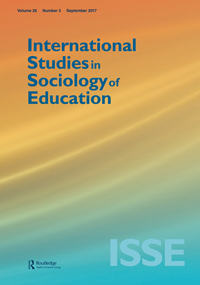Germany’s national (or ethnic) identity has become thoroughly European and there are even signs of Eurocentrism. This is particularly problematic for the Turkish Muslims who, arguably, are not European. This article explores how fifteen-year-old German and Turkish youth in two Stuttgart secondary schools, one in a predominantly working-class area (Tannberg Hauptschule) and the other in a more middle-class environment (Goethe Gymnasium), negotiate their identities.
Drawing on documentary sources, focus groups and semi-structured interviews, the research found that at Tannberg, which at times adopted a Eurocentric approach and where some teachers were getting close to being Islamophobic, young people developed ethno-national identities. In contrast, at Goethe, which promoted European values alongside rather than instead of multicultural values, young people employed national-European hybrid identities. This article raises important questions about the role of education in the development of identities, and how to address notions of cultural insensitivity and inequality.
Author: Daniel Faas
Read the article.



